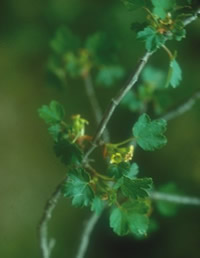| Ribes sardoum | |
|---|---|
 | |
| Scientific classification | |
| Kingdom: | Plantae |
| Clade: | Tracheophytes |
| Clade: | Angiosperms |
| Clade: | Eudicots |
| Order: | Saxifragales |
| Family: | Grossulariaceae |
| Genus: | Ribes |
| Species: | R. sardoum |
| Binomial name | |
| Ribes sardoum Martelli 1895 | |
Ribes sardoum, commonly called Sardinian currant, is a species of plant in the gooseberry family. It is endemic to Italy, found only on the island of Sardinia. [2] [3]
